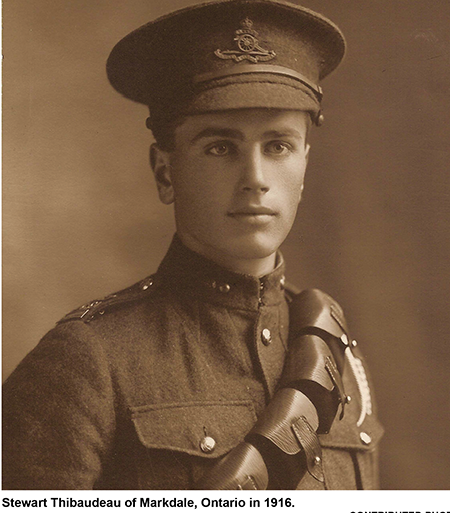An eventful night
By Tim Lambrinos
 This month we have a real-life account of one evening in France during World War One. The account was written in 1918 by my grandfather, Stewart Thibaudeau.
This month we have a real-life account of one evening in France during World War One. The account was written in 1918 by my grandfather, Stewart Thibaudeau.
If you’re faint of heart and aren’t up to reading about the horrors endured by soldiers in a war from more than 100 years ago, don’t read this article. But if you want to reflect upon what these young men, from both sides, had to live through, please read this graphic account of what would be no less than trying to survive in a living hell. Everyday events included watching comrades being killed alongside them in mud and lice and the phrase “going over the top” was one that you would dread hearing.
It’s an emotional account where things could have easily turned out differently. And therefore my mother’s existence, followed by me, would never have been. It’s an account where my grandfather was nearly executed by one of his own countrymen when he was confronted for possibly being a spy. And how if he spoke any French at all, it may have saved his life. You should know that after the war, he returned to Canada to attend the University of Toronto to learn to speak Canada’s other official language and in due course, he became a French teacher. This story and many others like it should be reflected upon on Remembrance Day to fully appreciate the offerings that were sacrificed in this worldwide cause, not only in giving a life for a country, but for having to endure the sheer horrors and living conditions that were part of soldiers’ everyday lives all around the world. Lest we forget.
An Eventful NightWritten by Stewart Thibaudeau[/i]
On the night of August 10, 1918, we had reached beyond the village of Méharicourt on the third day of our offensive on the Amiens front. Though we could hardly realize it at the time, this push was to culminate in the end of the war some three months later. It was a fine moonlight night, balmy enough that sleeping out of doors was a pleasure. When we reeled out our telephone wire to the front line we found the infantry of the twenty-fourth, (New Brunswick) battalion in a state of unusual excitement. A few minutes before, two German Military policemen had come riding their bicycles on the road which ran through their unobstructed front line and had been unaware of their predicament until they fell into the hands of our infantry. One of them very unwisely made a show of resistance and was shot forthwith. His more lucky companion was taken prisoner. All evidence of this encounter had disappeared when my mate and I set up our telephone and contacted our battery. We felt grateful for the serenity of our surroundings and hoped to have a quiet night since our battery was to leave from the Arras front on the following day to begin a new offensive.
However, the night and the following day were to be packed with bizarre incidents. The first of these was a small bomb which exploded some thirty feet from where I was stretched on the parados. The bomb had been dropped by a strange plane which droned low overhead. Naturally I rolled into the crude trench with alacrity though I could not conceive the purpose of the bomb. It could not have been larger than a Mills hand grenade and was certainly not a flare. I had no sooner scrambled to my feet than I was rushed by one of the soldiers who attacked me with his fixed bayonet, thrusting at my breast. He was talking fiercely in French, so rapidly and excitedly that I could have no idea of his purpose. To defend myself I seized the bayonet with both bare hands but did not attempt to wrest the weapon from him. If I had done so it would have been very easy for him to withdraw it and thrust it deep into my unprotected body. The intervention of the other soldiers saved me. They too were French-speaking and made me understand that my attacker mistook me for a German spy. I did my best to demonstrate that my telephone, which was supposed in his disordered mind to have flashed a signal to the plane, was nothing more than a Mark-six telephone with its case. Then the soldiers turned on my attacker and insisted that he must be a spy. Very quickly two soldiers led the would-be hero away and the excitement gradually subsided. The remainder of the night was quiet enough for the enemy were in no position to counter-attack.
At daybreak one of our planes flew low over their line about two hundred yards away and drew fire from German machine-guns. We dutifully informed our battery, the fifteenth, and our gunners fired several rounds of eighteen-pounder shells with commendable accuracy. These merely made the Germans look for a “better hole”, thus affording a bit of entertainment for our men who watched the show, with approval. However, the problem was still unsolved.
In a very foolish attempt to clear up the situation an eager troop of Bengal Lancers galloped up suddenly on our right flank. They had succeeded in getting up close to our front line for the view of the machine gunners had been obscured by the trees of an orchard just back of us. When they came in sight of the enemy they were met by a hail of bullets which effectively halted their further progress and left many of them, dead or wounded. We had been observing all this action but ducked our heads in time. A soldier standing next to me had his helmet knocked neatly from his head, but we suffered no casualties. With the unfortunate cavalrymen it was a different story and some of them fell at our feet in the trench. It was the Charge of the Light Brigade in miniature, just as insane and just as ineffectual.
I was dispatched in order to explore the trench for other dead or wounded and as I came round a bay I met abruptly a sergeant who pointed his revolver. He had been resolved to sell his life dearly for he supposed he was in the front line of the enemy. When we returned, the humaneness of his feelings was evident as he took one of his dying comrades in his arms and spoke tenderly to him. Then looking over the parapet he saw a horse still standing on the road some twenty yards away. It had been struck by a bullet in the left hind leg and was obviously so badly wounded that it would never walk again. There upon the sergeant took steady aim but I could not help thinking how foolish he was if he thought he could kill the horse at that distance and so relieve it from its misery. But one shot in the - felled the poor creature. This soldier of the British army was ideal, possessing as he did courage, kindliness and efficacy, qualities seldom combined.
It seemed as if the situation of our infantry would remain unsatisfactory, but suddenly bursts of six-inch trench mortar shells sent the dangerous machine-gunners scurrying from their position. The mortars had been set up in the orchard just in time. The relief of those who were to go over the top can easily be understood. It is likely that they forgot at the time their dislike of trench mortars which frequently disturbed their life in the front line by drawing retaliatory fire from the Germans.
What were the subsequent adventures of the twenty-fourth battalion I have never heard, but some of them must have survived to cross the Rhine at Bonn as the lucky ones of the sixty-seventy battery did. In that case they might have witnessed the extraordinary events that have nearly bewildered all of us.
Note: This account is true in every detail though even the village where the events happened looks a bit suspect. It combines the Arabic word for dromedary with the Latin word for the headquarters of a cohort. It is unusual in that so much happened during one night and the early part of the morning. Often such time could be even dull or monotonous.
Stewart Thibaudeau
67 Depot Battery C.F.A.
Gunner 337898














